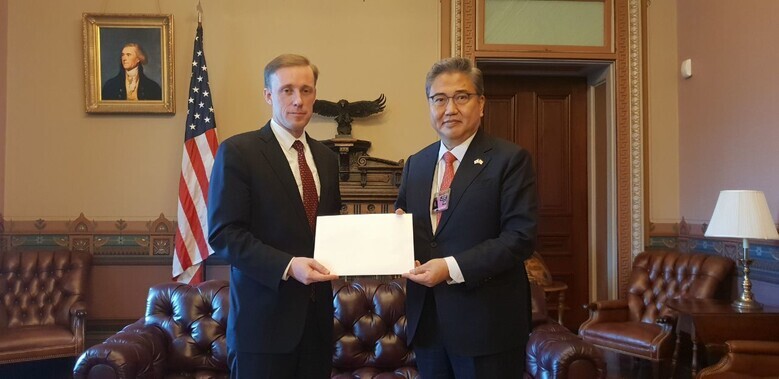hankyoreh
Links to other country sites 다른 나라 사이트 링크
Yoon envoy discusses deployment of US strategic assets to Korean Peninsula with Jake Sullivan

A delegation for South Korea-US policy discussions sent by President-elect Yoon Suk-yeol delivered a letter from Yoon to US President Joe Biden during a visit to the White House on Tuesday.
Meeting with reporters after delivering the letter through Jake Sullivan, the White House national security advisor, delegation leader and People Power Party lawmaker Park Jin explained, “We delivered a letter reflecting President-elect Yoon’s firm commitment to and vision for developing the South Korea-US alliance.”
According to Park, the letter included a call from Yoon to develop the South Korea-US relationship into a “comprehensive strategic alliance” to respond to issues related to the North Korean nuclear program, the economy and security.
Park also said that “opinions were exchanged on the need to hold a South Korea-US summit shortly after the new administration takes office.” He added that no concrete time or place had been discussed.
Park further explained that he had held discussions with Sullivan on the North Korean nuclear program and South Korea-US joint defense capabilities. When asked if there had been any mention of the deployment of strategic assets, he replied, “The deployment of strategic assets is an important element in strengthening extended deterrence, and you could say that we discussed it in those terms.”
Some observers are predicting that if North Korea follows its recent intercontinental ballistic missile (ICBM) test launch with additional severe violations of UN Security Council resolutions — including a possible seventh nuclear test — the US may opt to deploy strategic assets to the Korean Peninsula, including B-52 aircraft and other strategic bombers capable of carrying nuclear weapons, as well as aircraft carriers and nuclear submarines capable of carrying submarine-launched ballistic missiles (SLBMs).
If that happens, it would turn the clock on North Korea-US relations back to their state in 2017, when the two sides were entangled in a heated nuclear confrontation and making threatening references to “pushing the button.”
The delegation met later with US Secretary of Defense Lloyd Austin. The delegation quoted Austin as stressing the great importance of “strengthening the South Korea-US alliance and maintaining robust joint defense capabilities.”
Meanwhile, Sung Kim, the US special representative for North Korea, met in Washington the same day with Liu Xiaoming, the Chinese government’s special representative on Korean Peninsula affairs.
According to the US State Department, Kim “reiterated the importance of responding firmly” to North Korea’s ICBM launch, while the two representatives “discussed opportunities to advance our shared goal of denuclearizing the Korean Peninsula and how to encourage the DPRK to engage in meaningful negotiations.”
In a written testimony submitted to the House Armed Services Committee, Chairman of the US Joint Chiefs of Staff Mark Milley said that North Korea’s development of ICBM technology “poses real threats to our allies and partners in the Indo-Pacific as well as the homeland.”
In his own response to the same committee, Austin said, “We face persistent threats from North Korea, with its nuclear arsenal and developing missile capability.”
By Lee Bon-young, Washington correspondent
Please direct questions or comments to [english@hani.co.kr]

Editorial・opinion
![[Editorial] Penalties for airing allegations against Korea’s first lady endanger free press [Editorial] Penalties for airing allegations against Korea’s first lady endanger free press](https://flexible.img.hani.co.kr/flexible/normal/500/300/imgdb/original/2024/0502/1817146398095106.jpg) [Editorial] Penalties for airing allegations against Korea’s first lady endanger free press
[Editorial] Penalties for airing allegations against Korea’s first lady endanger free press![[Editorial] Yoon must halt procurement of SM-3 interceptor missiles [Editorial] Yoon must halt procurement of SM-3 interceptor missiles](https://flexible.img.hani.co.kr/flexible/normal/500/300/imgdb/child/2024/0501/17145495551605_1717145495195344.jpg) [Editorial] Yoon must halt procurement of SM-3 interceptor missiles
[Editorial] Yoon must halt procurement of SM-3 interceptor missiles- [Guest essay] Maybe Korea’s rapid population decline is an opportunity, not a crisis
- [Column] Can Yoon steer diplomacy with Russia, China back on track?
- [Column] Season 2 of special prosecutor probe may be coming to Korea soon
- [Column] Park Geun-hye déjà vu in Yoon Suk-yeol
- [Editorial] New weight of N. Korea’s nuclear threats makes dialogue all the more urgent
- [Guest essay] The real reason Korea’s new right wants to dub Rhee a founding father
- [Column] ‘Choson’: Is it time we start referring to N. Korea in its own terms?
- [Editorial] Japan’s rewriting of history with Korea has gone too far
Most viewed articles
- 160% of young Koreans see no need to have kids after marriage
- 2[Editorial] Penalties for airing allegations against Korea’s first lady endanger free press
- 3Presidential office warns of veto in response to opposition passing special counsel probe act
- 4Hybe-Ador dispute shines light on pervasive issues behind K-pop’s tidy facade
- 5Anti-immigration candidate marauds across Korea with squad detaining foreigners
- 6Months and months of overdue wages are pushing migrant workers in Korea into debt
- 7Alleged drug use by Korean A-listers rocks nation – but not for the first time
- 8[Column] Unsettling moves by the UN Command lay way for Korean involvement in Taiwan
- 9[Reporter’s notebook] In Min’s world, she’s the artist — and NewJeans is her art
- 10Bills for Itaewon crush inquiry, special counsel probe into Marine’s death pass National Assembly